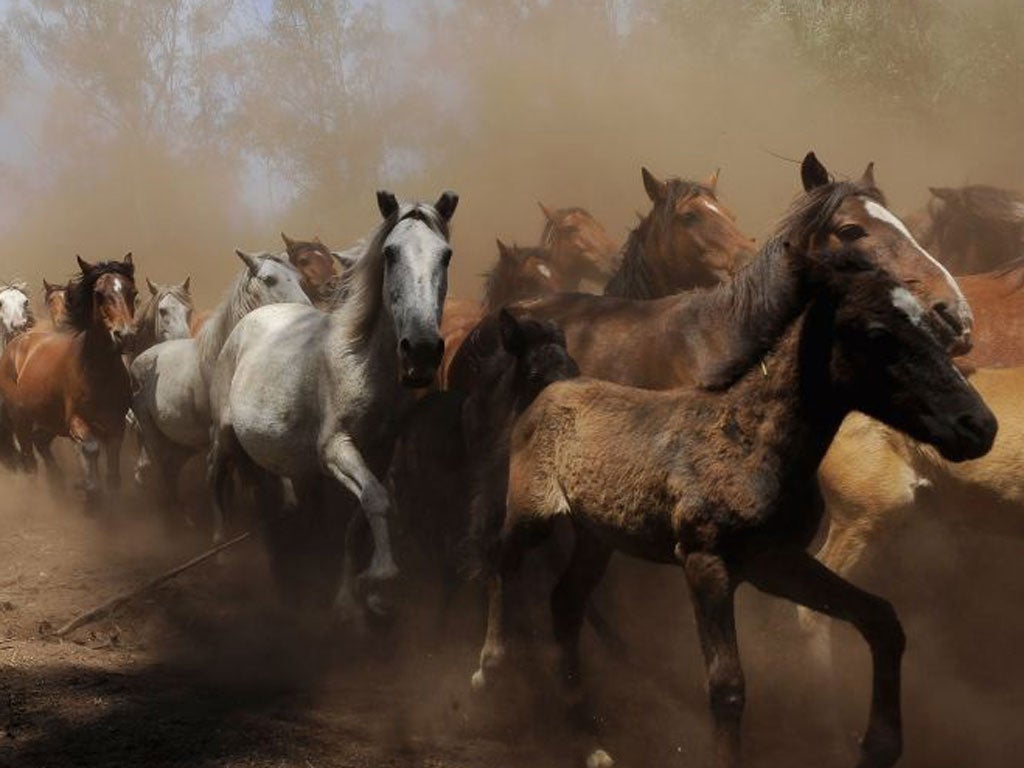Brother Mendel's Perfect Horse: Man and beast in an age of human warfare, By Frank Westerman (trans. Sam Garrett)
The cherished bloodline of the Lipizzaner runs back into Europe's darkest moments

I hadn't read many pages of Frank Westerman's history of the Lipizzaner horse before the magnificent bronze stallion from the Animals in War Memorial on Park Lane sprang to my mind. Given that I don't count myself among the world's animal lovers, every time I catch sight of it, I think it's slightly pointless. Westerman's book, however, made me think about these creatures differently. The tale he weaves of man and beast in wartime is a sweeping, bloody history of Europe from the Napoleonic Wars to the present day that ultimately questions its cosmopolitan future.
His story begins in the Netherlands of his childhood, at his local riding school, where he's introduced to his first Lipizzaner. "When you touch a Lipizzaner," he's told by the horse's proud owner, "you're touching history." The steeds were originally found only in imperial stables, bred as personal mounts for the Emperor of Austria-Hungary. Westerman criss-crosses Europe in the hoof steps of this sought-after breed. His journey takes him from the elite training ring of the Spanish Riding School inVienna, once the capital of the Habsburg Empire, to imperial stud farms in the inhospitable heights of the Alps, through Nazi eugenics experiments inside the gates of Auschwitz, and beyond.
So rare is the breed, it has "precisely six stallion lines". Even today, all new foals have to be registered by hand in the official stud books. This scarcity has ensured the Lipizzaner's value as spoils of war, and evacuation, escape and deportation routes for the animals can be charted from the late 18th century through the First and Second World Wars, and up to 2007. Then Lipizzaner "prisoners of war" held in Serbia for 16 years were finally returned to their home in Lipik, Croatia. All this is neatly illustrated by maps in Westerman's book.
The history of the Lipizzaner "diaspora" and their subsequent "rescue" is fodder enough for an interesting history: whether Hitler's confiscation of the animals to bring them together in the Sudetenland "like long-lost sons", or the deal Colonel Podhajsky, the German-appointed officer in charge of the Spanish Riding School, negotiated with the Americans in the final days of the Second World War to prevent his horses from falling into Russian hands.
But Westerman uses this story of the lure of these pure-blooded beasts as a prism that reflects the history of genetics. He notes the unsettling similarities between the Nazis' "Aryan tables" and the Lipizzaners' "obligatory physical standards" form, and reminds us that SS candidates had to prove five generations of pure-bloodedness - the same five generations needed for a Lipizzaner to be considered a thoroughbred. Westerman argues that this wasn't as straightforward a quest for racial purity as it first appears. "While the ultimate racial segregation was being carried out in the world of Homo sapiens," he explains, Auschwitz was also home to experiments in mating horses of the "most diverse breeds possible" in an attempt to create the "ideal warhorse".
Westerman's own unique process of hybridisation, his mix of travel writing and history, yet again proves a winner. Readers looking for a more traditional account might find his digressions off-putting, but ultimately he proves himself an enquiring and thoughtful historian.
Buy Brother Mendel's Perfect Horse (Harvill Secker) from independentbooksdirect.co.uk for £13.99 (RRP £16.99) including postage or call 0843 0600030
Join our commenting forum
Join thought-provoking conversations, follow other Independent readers and see their replies
Comments